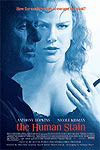The Human Stain (R) ★★
 Based on Philip Roth's novel, The Human Stain offers a spotty portrait of one man's attempt to remove the stain of a lifetime's deception.
Based on Philip Roth's novel, The Human Stain offers a spotty portrait of one man's attempt to remove the stain of a lifetime's deception.
Story
As dean of a small college, Coleman Silk (Anthony Hopkins) has made a nice life for himself--until a false accusation of racism ruins his career and he loses his wife to a brain aneurysm. Suddenly, Coleman has nothing--until he embarks on an intensely sexual relationship with Faunia Farley (Nicole Kidman), a local woman with an abusive ex-husband, Lester (Ed Harris), who won't leave her alone. The intensity of Coleman's love for Faunia leads him to reveal his long-held secret: He has been passing himself off as Jewish and white for most of his adult life, but in reality he is a light-skinned African-American. From there, a series of flashbacks to the 1940s introduce us to a younger, love-struck Coleman (Wentworth Miller) and reveal the events that led him to his fateful decision. Somehow, Coleman's deep dark secret isn't as shocking as it's probably meant to be, but the relationship between Faunia and Coleman is--especially when it slips into the danger zone, with Lester breathing down their necks.
Acting
Wentworth Miller, who makes his film debut as the younger Coleman, does an amazing job with his role, establishing Coleman's quiet, yet fierce, determination to live a life free of intolerance. And as ever, Hopkins is the consummate professional, with flashes of intense passion and brilliance in his steely eyes. One does have to get over the fact that a Welsh actor has been cast as an elderly light-skinned African-American, but if Hopkins can give nuance to a declaration of how Viagra has changed his character's life (ick), he can pull off the race thing easily enough. Kidman as the dour Faunia also has some stunning moments, easily sinking to the depressive depths required of her character--not surprising considering she won the Oscar doing the same thing in The Hours. What really makes you clench your teeth, though, is when the two of them get together on screen--in the biblical sense. These Oscar winners are so sorely miscast as tortured lovebirds that their sexual moments make you squirm in your seat. It's not the age difference; there's simply no spark between them.
Direction
''We leave a stain, a trail and imprint,'' Philip Roth writes in his novel, the third in a trilogy on postwar America. ''It's the only way to be here.'' The author goes on to explore myriad themes around this main premise, including how we leave our marks, how our decisions have consequences, and how people can find one another under the direst circumstances. Unfortunately, these big ideas get lost in translation on the big screen, and the film suffers from adaptation blues. Director Robert Benton and screenwriter Nicholas Meyer gives Roth's ideas voice only through Nathan Zuckerman (Gary Sinise), the reclusive author Coleman asks to write his life story, and even that artistic character talks more about how sex is clouding Coleman's judgment than about his own life or ideology. Ultimately, Meyer focuses his script too heavily on the guarded Coleman, leaving the other characters too little developed. Why has Nathan secluded himself away from the world? What haunts him? Sinise does what he can with the character but there's too little background. The same goes for Faunia. Although she describes in one monologue after another the horrors of her life--she was abused as a girl and lost her two children in a terrible fire--Faunia's hardships seem distant and it's hard to connect with her character. Only the wounded Lester, a Vietnam veteran, seems made of real emotions and desires--he's filled with hatred and passion--and if he makes only a brief appearance in the film, he certainly leaves a mark.
Bottom Line
The title really says it all: Even with a top-notch cast, The Human Stain is only an imprint rather than a cohesive film. Read the novel instead to get the whole picture.
To get the full Quicklook Films experience, uncheck "Enable on this Site" from Adblock Plus
box office top 10

Civil War Released: April 12, 2024 Cast: Kirsten Dunst, Wagner Moura 11.1M

Abigail Released: April 19, 2024 Cast: Melissa Barrera, Dan Stevens 10.2M

Godzilla x Kong: The New Empire Released: March 29, 2024 Cast: Rebecca Hall, Brian Tyree Henry 9.5M

The Ministry of Ungentlemanly Warfare Released: April 19, 2024 Cast: Henry Cavill, Eiza Gonzalez 9M

Spy x Family Code: White Released: April 19, 2024 Cast: Takuya Eguchi, Saori Hayami 4.9M

Kung Fu Panda 4 Released: March 8, 2024 Cast: Jack Black, Viola Davis 4.6M

Ghostbusters: Frozen Empire Released: March 22, 2024 Cast: Paul Rudd, Carrie Coon 4.4M

Dune: Part Two Released: March 1, 2024 Cast: Timothée Chalamet, Rebecca Ferguson 2.9M

Monkey Man Released: April 5, 2024 Cast: Dev Patel, Sikandar Kher 2.2M

The First Omen Released: April 5, 2024 Cast: Nell Tiger Free, Bill Nighy 1.7M






